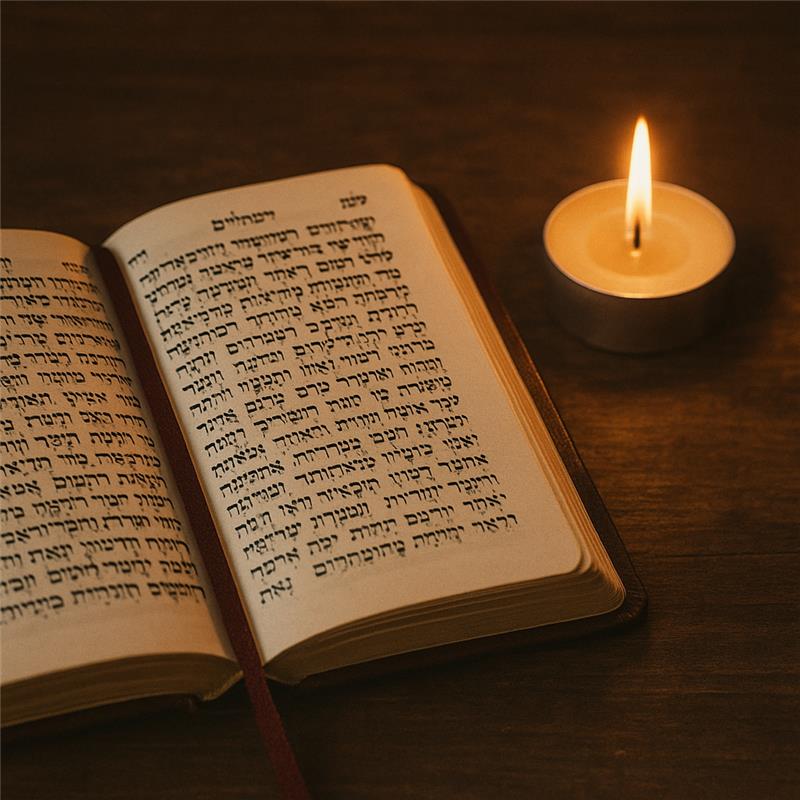Home » Tehillim for Success in Every Situation » Prayer for Strength: Torah Wisdom for Rising from Life’s Challenges
Prayer for Strength: Finding Chizuk
Through Torah and Tzedakah
Discover how Emperor Nero became Rabbi Meir’s ancestor and what other Roman converts teach us about transformation.
The Torah's Timeless Prayer for Strength
Throughout Jewish history, in moments when the burden feels unbearable and the spirit wavers, our Sages have taught us to turn to Hashem through a prayer for strength combined with acts of tzedakah (charity). The Talmud teaches that “Great is tzedakah, for it brings the redemption closer” (Bava Basra 10a), understood by our Sages as referring to both one’s personal salvation from troubles and hastening the Final Redemption. When we combine this heartfelt prayer for strength and guidance with the mitzvah of supporting the poor, we create what our tradition calls a zechus—spiritual merit that can help open the gates of Heaven for mercy.
One powerful tradition for enhancing any prayer for strength involves invoking the merit of Rabbi Meir Baal Haness, the great Tanna whose name has become synonymous with miraculous salvation. The Talmud (Avodah Zarah 18a-b) records how Rabbi Meir called upon Hashem with the words “Eloka d’Meir aneni” (God of Meir, answer me) in a time of great danger, and was miraculously saved. For centuries, Jews have given tzedakah to the poor of Israel while invoking Rabbi Meir’s merit, believing that charity given in his name carries special power. His yahrzeit on the 14th of Iyar (Pesach Sheni) continues to draw thousands to his tomb in Tiberias seeking yeshuos (salvations). Rabbi Meir Baal Haness Charities, founded in 1799, continues facilitating this sacred tradition. The organization not only distributes funds to Torah scholars, widows, orphans, and families in need throughout Eretz Yisroel, but also accepts kvittel requests for prayers at Rabbi Meir’s tomb, coordinates Torah learning in the merit of donors, and ensures that those seeking spiritual strength through tzedakah are connected with the most deserving recipients of their charity.
Additional Tehillim Resources
Related Torah Resources:
Understanding the Connection Between Prayer for Strength and Tzedakah
Torah Teaching on Prayer and Tzedakah
Jewish tradition teaches that combining a prayer for comfort and strength with giving tzedakah demonstrates emunah (faith) that transcends immediate circumstances. The Midrash (Devarim Rabbah 2:12) teaches: “The gates of prayer are sometimes open and sometimes closed, but the gates of teshuvah (repentance) are always open.” Since tzedakah is considered a central component of teshuvah, combining charity with prayer creates a dual approach—the prayer itself and the act of giving that demonstrates teshuvah. This dual pathway helps ensure our prayers ascend to Heaven through whichever gate is open.
When directed to the poor of Eretz Yisroel, this act of charity carries special significance according to the Shulchan Aruch (Yoreh De’ah 251:3), which establishes the priority order for giving tzedakah, stating that “the poor of Eretz Yisrael have precedence over the poor of other places”.
The Traditional Prayer for Strength - Tehillim Chapter 27
King David composed Tehillim as Divinely-inspired prayers for all situations. Chapter 27, known as “L’David Hashem,” has become particularly associated with finding strength during challenging times. Our Sages teach that this Psalm, with its themes of trust in Hashem despite enemies and challenges, contains within it the power to strengthen the heart and restore courage. It is traditionally recited twice daily from during the month of Elul through Hoshanah Rabbah in Ashkenazi communities.
Tehillim Chapter 27 - A Prayer for Strength
לְדָוִד יְהוָה אוֹרִי וְיִשְׁעִי מִמִּי אִירָא יְהוָה מָעוֹז חַיַּי מִמִּי אֶפְחָד׃
L'David - Hashem is my light and my salvation; whom shall I fear? Hashem is the stronghold of my life; of whom shall I be afraid?
בִּקְרֹב עָלַי מְרֵעִים לֶאֱכֹל אֶת בְּשָׂרִי צָרַי וְאֹיְבַי לִי הֵמָּה כָשְׁלוּ וְנָפָלוּ׃
When evildoers draw near to me to devour my flesh, my adversaries and my enemies against me, they stumbled and fell.
אִם תַּחֲנֶה עָלַי מַחֲנֶה לֹא יִירָא לִבִּי אִם תָּקוּם עָלַי מִלְחָמָה בְּזֹאת אֲנִי בוֹטֵחַ׃
Though an army encamp against me, my heart shall not fear; though war rises up against me, in this I will be confident.
אַחַת שָׁאַלְתִּי מֵאֵת יְהוָה אוֹתָהּ אֲבַקֵּשׁ שִׁבְתִּי בְּבֵית יְהוָה כָּל יְמֵי חַיַּי לַחֲזוֹת בְּנֹעַם יְהוָה וּלְבַקֵּר בְּהֵיכָלוֹ׃
One thing I have asked of Hashem, that will I seek after: that I may dwell in the house of Hashem all the days of my life, to behold the graciousness of Hashem, and to visit in His Temple.
כִּי יִצְפְּנֵנִי בְּסֻכֹּה בְּיוֹם רָעָה יַסְתִּרֵנִי בְּסֵתֶר אָהֳלוֹ בְּצוּר יְרוֹמְמֵנִי׃
For He will hide me in His pavilion in the day of evil; He will conceal me in the secret of His tent; He will lift me up upon a rock.
וְעַתָּה יָרוּם רֹאשִׁי עַל אֹיְבַי סְבִיבוֹתַי וְאֶזְבְּחָה בְאָהֳלוֹ זִבְחֵי תְרוּעָה אָשִׁירָה וַאֲזַמְּרָה לַיהוָה׃
And now shall my head be lifted up above my enemies around me; therefore I will offer in His tent sacrifices of joy; I will sing, yea, I will sing praises unto Hashem.
:שְׁמַע יְהוָה קוֹלִי אֶקְרָא וְחָנֵּנִי וַעֲנֵנִי
Hear, Hashem, when I call with my voice; be gracious unto me, and answer me.
לְךָ אָמַר לִבִּי בַּקְּשׁוּ פָנָי אֶת פָּנֶיךָ יְהוָה אֲבַקֵּשׁ׃
To You my heart has said, “Seek My face”; Your face, Hashem, will I seek.
אַל תַּסְתֵּר פָּנֶיךָ מִמֶּנִּי אַל תַּט בְּאַף עַבְדֶּךָ עֶזְרָתִי הָיִיתָ אַל תִּטְּשֵׁנִי וְאַל תַּעַזְבֵנִי אֱלֹהֵי יִשְׁעִי׃
Hide not Your face from me; turn not Your servant away in anger; You have been my help; cast me not off, neither forsake me, O God of my salvation.
כִּי אָבִי וְאִמִּי עֲזָבוּנִי וַיהוָה יַאַסְפֵנִי׃
For my father and my mother have forsaken me, but Hashem will take me in.
הוֹרֵנִי יְהוָה דַּרְכֶּךָ וּנְחֵנִי בְּאֹרַח מִישׁוֹר לְמַעַן שׁוֹרְרָי׃
Teach me Your way, Hashem, and lead me in a level path, because of those who lie in wait for me.
אַל תִּתְּנֵנִי בְּנֶפֶשׁ צָרָי כִּי קָמוּ בִי עֵדֵי שֶׁקֶר וִיפֵחַ חָמָס׃
Deliver me not over to the will of my adversaries; for false witnesses have risen up against me, and breathe out violence.
לוּלֵא הֶאֱמַנְתִּי לִרְאוֹת בְּטוּב יְהוָה בְּאֶרֶץ חַיִּים׃
Had I not believed to see the goodness of Hashem in the land of the living!
קַוֵּה אֶל יְהוָה חֲזַק וְיַאֲמֵץ לִבֶּךָ וְקַוֵּה אֶל יְהוָה׃
Hope in Hashem; be strong, and let your heart take courage; yea, hope in Hashem.
The Power of Tehillim Chapter 27 as a Prayer for Strength
Jewish tradition understands this Psalm as David’s personal prayer when facing fear and enemies, making it particularly appropriate for anyone seeking strength. The repetition of “קַוֵּה אֶל יְהוָה” (Hope in Hashem) at the conclusion emphasizes maintaining faith even when strength wavers. As the Talmud teaches in Berakhot 32b: “If a person prays and is not answered, he should pray again, as it says, ‘Hope in Hashem, be strong and He will give your heart courage, and hope in Hashem again.'”
The Arizal (Rabbi Isaac Luria, 16th century) taught that giving charity before prayer helps ensure its acceptance, explaining that the act of giving opens our hearts and makes us vessels worthy of receiving Hashem’s blessings. This teaching, based on the Talmudic practice of Rabbi Eleazar, has guided how many approach their daily prayer for strength.
Different Ways to Apply This Prayer for Strength
Jewish tradition offers various approaches to enhance your prayer for strength:
Morning Prayer for Strength
Many begin their day with Tehillim 27 as their morning prayer for strength, as the early morning hours are traditionally considered an auspicious time for prayer.
Prayer for Strength and Guidance
When seeking clarity in difficult decisions, reciting this prayer for strength and guidance with extra kavanah (intention) can help illuminate the path forward.
Prayer for Strength for a Friend
When offering a prayer for strength for a friend, mention their Hebrew name and their mother’s Hebrew name. The merit of praying for another can benefit both parties.
Prayer for Strength and Protection
In times of uncertainty, this prayer for strength and protection has sustained the Jewish people throughout history, providing spiritual fortification.
Prayer for Strength and Peace
For those seeking inner tranquility, using this as a prayer for strength and peace can help restore balance and calm to the neshamah (soul).
Torah Wisdom on Finding Strength
The Jewish approach to finding strength emphasizes that challenges are opportunities for spiritual growth. The Mishnah in Pirkei Avos (4:1) asks, “Who is strong?” and answers, “One who conquers his inclination.” This teaches that true strength comes not from avoiding difficulty but from facing it with faith and proper action.
The Talmud in Berakhot 32b teaches about persistence in prayer: “If one prays and is not answered, let him pray again,” citing the double mention of “hope in Hashem” in Psalm 27. This shows that consistency in spiritual practice matters—a brief daily prayer for strength, recited with sincerity, builds spiritual resilience over time. The combination of prayer with tzedakah creates what our Sages call a “double mitzvah”—helping ourselves while helping others.
Traditional Guidelines for Your Prayer for Strength Practice
Three Steps for Your Prayer for Strength
Prepare Your Heart
Recite with Intention
Personal Connection
The Role of Tzedakah in Strengthening Prayer
While prayer alone has tremendous power, our tradition teaches that combining a prayer for strength with tzedakah creates additional merit. The act of giving, especially when we ourselves are struggling, demonstrates faith that Hashem will provide for our needs. As the Talmud states, giving even a small coin to the poor makes one “worthy to receive the Divine Presence” in prayer (Bava Basra 10a).
Rabbi Meir Baal Haness Charities has facilitated this combination for over two centuries, ensuring that those who wish to accompany their prayers with tzedakah can support Torah scholars, widows, orphans, and struggling families in Eretz Yisroel. This creates a partnership between those seeking strength and those in need of support.
For those who choose this path, donations of any size are meaningful. Whether through a traditional pushka, online giving, or other forms of charity, the intention matters more than the amount.
Beginning Your Prayer for Strength Journey
Whether you’re facing a specific challenge or seeking to establish a daily spiritual practice, the combination of prayer for strength with acts of kindness has sustained the Jewish people for millennia. Start simply with what you can manage—even a single verse can be meaningful when said with sincerity.
Consider keeping a Tehillim near your bed for a morning prayer for strength, or in your bag for moments when you need spiritual support. If you choose to accompany your prayers with tzedakah, remember that even small, consistent amounts create significant merit over time.
About Rabbi Meir Baal Haness Charities
For over 200 years, Rabbi Meir Baal Haness Charities has served as the bridge between those seeking yeshuos and the needy families of Eretz Yisroel. Founded in 1799, this sacred institution distributes millions in tzedakah annually to Torah scholars, widows, orphans, and families facing hardship. The tradition of giving charity in Rabbi Meir’s name traces back to the famous Talmudic story (Avodah Zarah 18a-b) where Rabbi Meir invoked Divine help with the words “Eloka d’Meir aneni” (God of Meir, answer me) and was miraculously saved. Over the centuries, the Jewish people have maintained the custom of giving tzedakah while invoking Rabbi Meir’s merit, particularly when seeking divine assistance.
When you combine your prayer for strength with tzedakah through our organization, your donation provides immediate relief for groceries, medical expenses, support for widows and orphans, Torah scholars, and emergency aid during times of crisis. Every donation is handled with the utmost care and reaches those who need it most, creating real change in the lives of our brothers and sisters in Eretz Yisroel.
Strengthen Your Prayers Today
Frequently Asked Questions About Prayer for Strength
Why is Tehillim Chapter 27 particularly powerful as a prayer for strength?
The Psalm explicitly concludes with “Be strong and let your heart take courage,” making it especially relevant for those seeking strength. Jewish tradition understands it as King David’s prayer when facing enemies and fear, and the Talmud (Berakhot 32b) specifically references its final verse as teaching about persistence in prayer.
Is there a specific amount one should give when combining tzedakah with prayer for strength?
Jewish law teaches that giving is according to one’s means. The Talmud (Bava Batra 10a) shows that even a single coin given before prayer has merit. Common amounts include $18 (chai), $36 (double chai), or whatever one can afford. The consistency and intention matter more than the amount.
Can this prayer for strength be said in English if I don't understand Hebrew?
Yes, Jewish law permits prayer in any language one understands, as kavanah (intention) is crucial. However, there is special merit in the Hebrew words themselves, so many recommend saying both if possible.
When is the best time to say a prayer for strength?
While any time is appropriate, many find morning most effective for a daily prayer for strength. From Rosh Chodesh Elul through Hoshanah Rabbah, Ashkenazi tradition is to recite Psalm 27 twice daily—morning and evening. The key is consistency rather than specific timing.
How does this relate to medical or psychological treatment?
Prayer for strength is a spiritual practice meant to complement, never replace, professional care. Jewish law requires seeking medical treatment when needed, and prayer serves as additional spiritual support alongside proper care.
What if I feel too overwhelmed to pray?
The Talmud teaches that even a brief cry from the heart is considered prayer. The Gemara in Berakhot 32b encourages persistence—if you can only manage one verse, start there. Hashem values the effort of a struggling soul.
Final Blessing for Your Prayer for Strength
May your prayer for strength bring you chizuk (strength) in times of challenge and simcha (happiness) in times of joy. Whether you seek a prayer for strength and guidance, a hard time prayer for strength, or simply a daily morning prayer for strength, may the words of Tehillim and the merit of your good deeds stand for you and your loved ones.
As King David concludes in Tehillim 27: “קַוֵּה אֶל יְהוָה חֲזַק וְיַאֲמֵץ לִבֶּךָ” – “Hope in Hashem! Be strong and let your heart take courage!”
In the merit of Rabbi Meir Baal Haness, may you be blessed with Bracha and Hatzlochah in all your endeavors.

 Prayer for Protection
Prayer for Protection Jewish Prayer for Healing the Sick
Jewish Prayer for Healing the Sick Rabbi Meir’s Yahrzeit
Rabbi Meir’s Yahrzeit Tehillim Guide
Tehillim Guide
